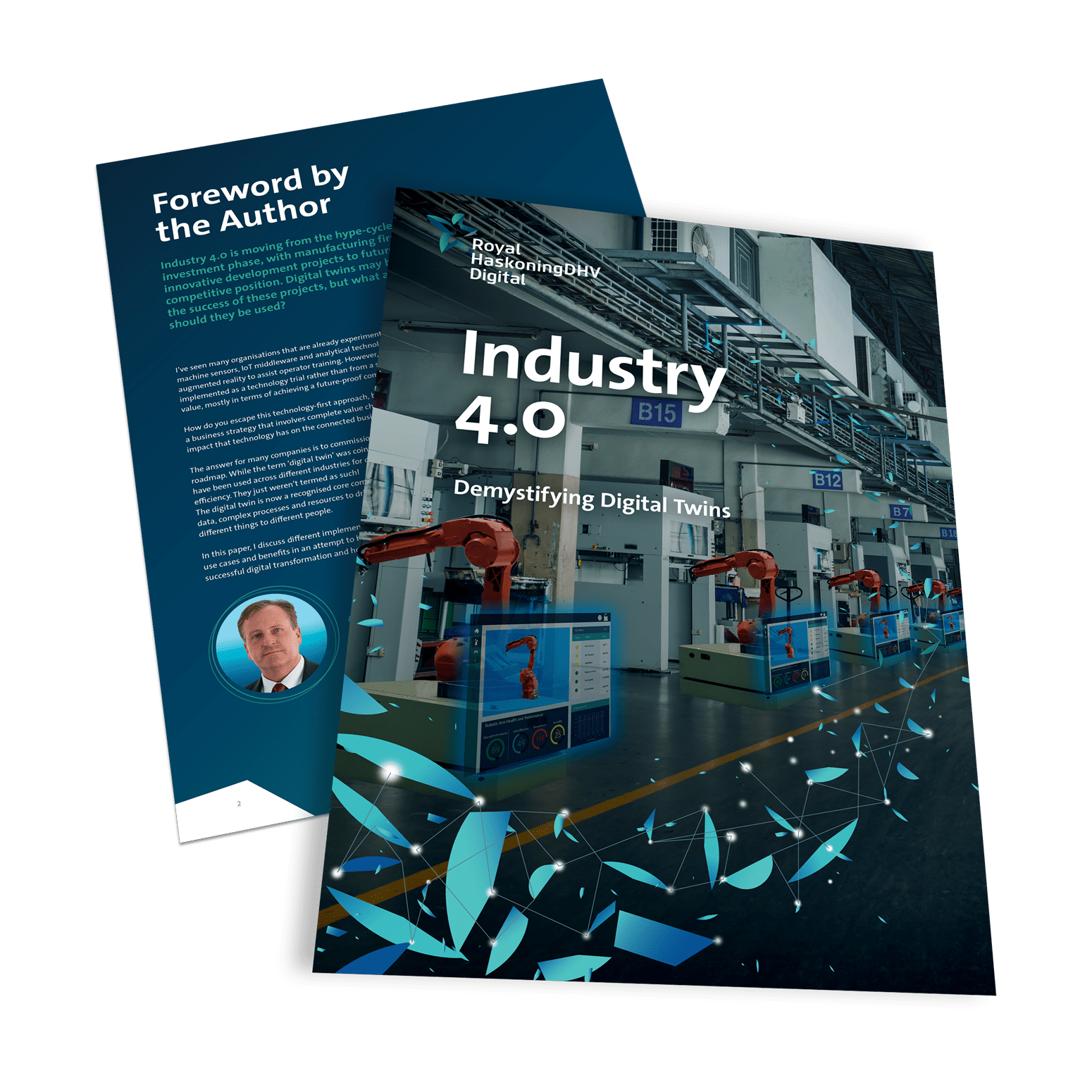Process Industry 4.0
How Industry 4.0 is transforming the process industry

As it adapts to Industry 4.0, the process industry has tended to focus on the adoption of technology. However, technology is only an enabler for the digital transformation journey, helping to modernise industrial plants.
The focus should be on using Industry 4.0 technologies to accelerate decision-making, optimise processes, maximise profits and minimise risks. So, what does Industry 4.0 really mean for the process industry? What are the barriers to its implementation? And how can we tackle these challenges? This blog answers these three questions.
The focus should be on using Industry 4.0 technologies to accelerate decision-making, optimise processes, maximise profits and minimise risks. So, what does Industry 4.0 really mean for the process industry? What are the barriers to its implementation? And how can we tackle these challenges? This blog answers these three questions.
2. Industry 4.0 technologies can optimise entire plants.
3. The industry needs data-led organisational and cultural change.
4. A clear, collaborative asset management strategy is vital.
Transforming the process industry
Industry 4.0 uses technologies to connect parts of a process that once relied on human communications, enabling adopters to collect, analyse and use data instantly. This industrial revolution also encompasses automation and mixed reality.These tools enable predictive and prescriptive maintenance of industrial assets to be carried out, significantly increasing the performance achieved by human operators and making production more flexible.
These are vital changes the process industry needs to make to stay competitive and agile in its approach to manufacturing. An industrial plant cannot perform well without fully functioning enabling assets such as energy systems, process water systems or logistics.
As such, the concept of industry 4.0 affects the full production chain, from the front gate to the back office, to ensure compliance, safety, and effective and sustainable operations. By taking a holistic approach to transformation, industrial sites of the future can optimise their impact on society too.
The barriers to implementation
To implement Industry 4.0 technologies, there are three crucial things businesses need to have: the essential engineering and technology knowledge and experience to apply it; access to the right vendors for devices such as sensors and machines; and advanced analytics and data science expertise.However, as the process industry begins its widespread adoption of Industry 4.0 technologies, we’re seeing some key barriers that could stand in the way of success.
First, there needs to be an organisational and cultural change so the industry can adopt agile ways of working. These changes require senior leadership to develop a clear vision and strategy for asset performance management and be brave in the face of the unknown.
Second, industrial devices from different original equipment manufacturers (OEMs) have different failure modes and probabilities associated with them. To enable predictive maintenance, manuals for the assets need to be enriched through the experiences of their operators and through data gathered by them.
The collected data needs to be assembled, structured and enriched with artificial intelligence (AI). This creates better understanding of different assets for fault detection and failure prediction, optimising operations like service order management and planning.
Third, the process industry needs affordable, reliable and safe infrastructure for internet-of-things (IoT) communications. Cloud-based software, easy-to-use applications and connected devices are readily available, but the communication technology needed to transfer data from these devices to the cloud is not yet cost-effective for the process industry.
This is a particular problem where large quantities of data need to be collected from specific assets wirelessly while they operate in harsh environments – such as explosive atmospheres.
Ensuring a successful implementation
To overcome these challenges and successfully implement Industry 4.0 technologies within the process industry, leaders need to clearly define an asset performance management strategy with the support of process engineers, who know the failure events of the industrial assets and know what operators need to improve.Equipment and asset knowledge, meanwhile, should be used to determine whether machinery is in optimal condition and what is needed to prevent failures.
A database with OEM-specific information on assets and plant-specific faults and abnormal behaviour events during operations can build your knowledge base for fault detection and failure mode predictions. Labelling the root cause of patterns improves the understanding of the industrial assets – a great help in asset performance management.
Data communications solutions for asset monitoring can be prohibitively expensive, particularly in heavy industrial environments. But utilities – such as a site's lighting infrastructure – could be exploited to provide a cost-effective communication channel to link sensors to the cloud.
Innovators who have experience with testing new technologies, for example drones, 3D inspection scanning and tackling problems with IoT communications, can accelerate a successful implementation of Industry 4.0 technologies.
Accelerating decision making
The focus of Industry 4.0 has been on the technology, connecting assets and collecting and structuring data. These aspects are the enabler, but the focus should be on using Industry 4.0 technologies to make the right decisions well in advance, optimise industrial processes, improve profits and mitigate risks.At Royal HaskoningDHV Digital, we have decades of experience in digital asset engineering, asset management, the development of digital twins. With our partners for platform development, innovative technologies and IT infrastructure, we can help the process industry accelerate its Industry 4.0 journey.
White paper
Download our white paper
For a more in-depth look at the role digital twins have to play in the rise of Industry 4.0, read our white paper Demystifying Digital Twins.

Stayupdated
Keeping up to date with the latest digital twin news? We've got you covered
